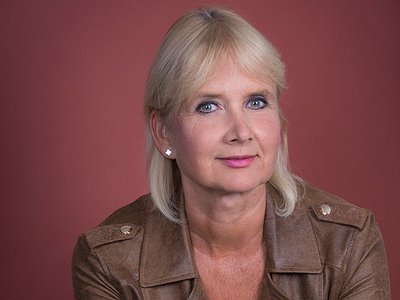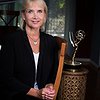Name: Lolita Ritmanis
Nationality: Latvian/American
Occupation: (Film Music) Composer
Recommendations:
1. Latvian composer Ēriks Ešenvalds - O Salutaris Hostia
2. An entire museum - in Hobart, Tasmania, Australia “MONA” The Museum of Old and New Art (Worth a trip to Tasmania to experience!)
Website / Contact: If you enjoyed this interview with Lolita Ritmanis and would like to discover more about her life and work, visit her website. Lolita is also the current president of the Alliance for Women Film Composers.
When did you start composing film music - and what or who were your early passions and influences? What what is about music and/or sound that drew you to it?
My sister Brigita was a huge influence on my musical development. I grew up hearing her practice hours on end (she is an accomplished pianist, who performed at Carnegie Hall at age 19.) She was my first piano teacher! I started writing songs when I was around 10 years of age. That eventually led to composing small pieces for orchestra, eventually composing a full musical. As a child I took piano, guitar and flute lessons, with great support from my parents. Although my sister Brigita is a professional musician, my mom, dad, and brother have always been involved in music as well. We are Latvian- Americans, culturally very involved in our Latvian roots. I sang in the choir (both at school in Portland, Oregon, and in the Latvian choir), played in the orchestra and in jazz band at Cleveland High School. Music was everywhere. When, at the age of 18 I was studying composing and arranging at the Dick Grove School of Music in Los Angeles, I became really interested in film music, continuing on to complete the film scoring program. The power of music to help tell a story was what captivated me. I am also a big lover of melody. I think film music benefits greatly from strong thematic composing, which is a very integral part of who I am as a composer.
For most artists, originality is first preceded by a phase of learning and, often, emulating others. What was this like for you? How would you describe your own development as an artist and the transition towards your own voice? What is the the relationship between copying, learning and your own creativity?
In film music we are often asked to emulate a temp score that has been used prior to the hiring of a composer, but perhaps we should go back a bit. Most of the great early film composers are actually drawing from the classical composers, the masters, especially from the romantic, and impressionistic periods. I certainly am influenced by everything that enters my sphere. Studying actual printed music scores is a great way to be in touch with how a composer achieved a certain sound through orchestration, or how he or she used counterpoint, etc.
I believe the essence of my own voice has been there since my early days of writing songs. The goal has been to eliminate as much peripheral noise that surrounds me every day, to allow for my voice to come through. This is a never ending process. The quest for knowledge and enrichment is never-ending as well. I am a season subscriber of the Los Angeles Philharmonic, as well as attend a great many concerts at universities, and other venues. I am an avid lover of film, theatre, dance. I am very fortunate to live in a city with so many opportunities to be culturally stimulated on a daily basis.
What were your main compositional challenges when starting out as a film composer and how have they changed over time?
Early on I tried to fill up every measure of music with a new idea, accentuating every dramatic beat, twist, or turn. It was a challenge accepting criticism, as when I first started I would take everything very personally, not realizing that it wasn’t all about me! My enthusiasm definitely got the best of me! I was so intense at times.
Over the years, hopefully I have evolved as a composer not only musically, but business wise. Understanding that the business is constantly changing has been and continues to be critical. Navigating the tremendous amount of feedback, and opinions that are often a central part of our collaborative process, is very very important. Allowing opinions, and suggestions to come through and truly register is crucial, and a huge part of this collaborative process, but at the same time, it is important to not lose one’s individuality, otherwise everything just begins to sound the same. Ego aside, it’s really about embracing collaboration without the collaboration derailing the inner creative voice.
What, to you, are the main functions and goals of soundtracks and film music and how would you rate their importance for the movie as a whole? How do you maintain a balance between, on the one hand, artistic integrity and sticking to your creative convictions and, on the other, meeting the expectations of the director?
Sometimes music functions like a character in the story - commenting, drawing attention to one thing or another. Other times music is felt subliminally. Every project is different, and every relationship is different. Especially when I embark on a new project with someone I have never worked with before - you must allow for the “getting to know one another” phase to allow for the best result. Trust is key. Once I feel as though I have the trust of the producer or director it frees up my creativity and I am not second-guessing myself as much.
What was your first studio like? How and for what reasons has your set-up evolved over the years and what are currently some of the most important pieces of gear for you?
My first real studio evolved when I was already an established composer. I had been working on a couple of TV series, for which there would always be a 30 piece orchestra. I was also orchestrating for other name composers. My composing was done at the piano, on score paper, sitting at the piano, with pencil in hand. I would then orchestrate, also with pencil, and send the scores off to the copyist to prepare the parts - all by hand. The studios where I conducted were Warner Bros., Paramount, Capitol, and others. When the show “Batman Beyond” needed a new sound, it necessitated “gearing up.” At that time we were talking about a high 5 figure investment. It had to be done if I wanted to continue working in town. I started working in Digital Performer, and still work in Digital Performer. My studio has evolved tremendously over the years. My husband, music producer Mark Mattson, also mixes my shows. He and I have duplicate set-ups, each in our own studios. We have a ton of gear, and sound libraries. I know that one of my greatest strengths is the fact that I did get my start in this field composing solely for live instruments. I am tremendously grateful that I fell in love with the orchestra. When samples became the norm, at least for mock-ups and lower budget projects, I still in my mind would always see and hear the real instrument and write for the instrument, with use of the samples, instead of writing for the samples.
How do you make use of technology? In terms of the feedback mechanism between technology and creativity, what do humans excel at, what do machines excel at?
One has to have the ability to show the producer or director material. Sharing a music cue, or an entire act - using sampled instruments, sound design, etc. that sounds like it will sound is what is expected. When the orchestra is hired it merely lifts the score to a higher level, but gone are the days of the “sound of the score” being a mystery until one steps on to a scoring stage.
Production tools, from instruments to complex software environments, contribute to the compositional process. How does this manifest itself in your work? Can you describe the co-authorship between yourself and your tools?
We owe a tremendous debt of gratitude to the creative geniuses making these cool new sounds available to us on a regular basis. I find it very important to use these magnificent tools, but regularly revisit the way I use the sounds to compose, using my compositional voice to guide me, not the sound of the samples guiding me.



